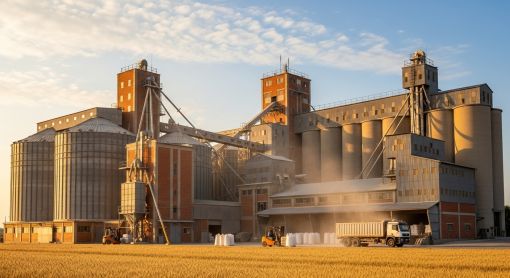FLOUR | MILLS | LEBANON
Lebanon Flour Mills, Factories and Producers
Wheat Flour and Grain Processing Factories
No factories matched your search criteria.
Related Blog Posts
The Millstone of a Nation: Lebanon's Enduring Flour Industry

For centuries, the rhythm of the millstone has been the heartbeat of Lebanese communities. From the fertile fields of the Bekaa Valley to the bustling ports of Beirut, the journey of wheat to flour is woven into the fabric of the nation's culture and cuisine. Bread, or 'khubz', is more than just sustenance; it's a symbol of hospitality and daily life. Today, this ancient tradition is carried on by a diverse array of modern flour mills and grain producers scattered across the country. Companies like the Modern Mills of Lebanon and Bekaa Mills Co. have replaced traditional water-powered stones with advanced technology, yet their purpose remains the same: to provide the essential ingredient for the nation's tables. These factories are not just industrial sites; they are the custodians of a legacy, ensuring that the aroma of freshly baked bread continues to fill Lebanese homes. The industry's resilience is a testament to its importance, adapting to modern demands for quality and safety while honoring a rich agricultural heritage. Understanding this sector means appreciating the deep connection between the land, the producers, and the people they serve, a connection that is fundamental to Lebanon's identity and food security.
Navigating the Lebanese Grain Supply Chain: From Port to Pantry

Lebanon's food security is intrinsically linked to the efficiency of its grain supply chain. The journey begins far beyond its borders, with the majority of wheat being imported through key maritime gateways. Upon arrival, the grain's transformation is handled by strategically located mills, such as the Dora Flour Mills and Société Industrielle du Levant in the Beirut area. These facilities are critical hubs, responsible for processing raw wheat into various types of flour tailored for the Lebanese market. The process involves rigorous quality control, cleaning, conditioning, and milling before the final product is packaged for distribution. From these central points, a complex network of logistics ensures that flour reaches every corner of the country, from large-scale commercial bakeries in Tripoli and Saida to small, family-run shops in the mountains of Chouf and Keserwan. This supply chain is a lifeline, facing numerous challenges including global price fluctuations and local economic pressures. The seamless operation of these mills and their distribution networks is paramount, highlighting the vital role of grain producers in maintaining stability and ensuring that every Lebanese family has access to this fundamental staple, day in and day out.
The Diverse Harvest: More Than Just Flour in Lebanon's Mills

While wheat flour is the cornerstone of Lebanon's grain industry, the nation's mills and producers offer a much wider array of products essential to its rich culinary landscape. A closer look at factories across governorates reveals a specialization in various grains, spices, and foodstuffs that define Lebanese cuisine. For instance, producers like Bayader Al Khair are renowned for their bulgur, a cracked wheat staple used in tabbouleh and kibbeh. Others, such as Al Kadamani Mills, focus on grinding a vibrant assortment of spices and other grains, providing the foundational flavors for countless traditional dishes. This diversity extends to animal feed, corn milling, and the packaging of pulses and legumes, showcasing a multifaceted industry that supports both human consumption and the broader agricultural sector. From the thyme and sumac processed by Silal Chtoura to the comprehensive grain services offered by Elias Al Saydanawi And Sons, these producers are vital. They are the guardians of flavor and variety, ensuring that the intricate tastes of Lebanese gastronomy are preserved and made accessible. Their work highlights that the grain industry isn't a monolith; it's a dynamic ecosystem catering to a sophisticated palate and contributing significantly to the nation's agricultural economy and cultural identity.
Supporting Local Mills: A Cornerstone for Lebanon's Economic Resilience

In a challenging economic climate, supporting local industries is more critical than ever, and Lebanon's flour and grain sector is a prime example. The network of mills and producers, from large-scale operations in major cities to smaller factories in regions like Akkar and Nabatieh, forms a vital pillar of the national economy. Each bag of flour purchased from a local producer like National Flour Mills Co or Crown Flour Mills represents an investment in Lebanese jobs, infrastructure, and self-sufficiency. By choosing locally milled products, consumers and businesses help sustain a crucial domestic supply chain, reducing reliance on imported finished goods and retaining value within the country. This support has a ripple effect, benefiting farmers, logistics providers, packaging companies, and the thousands of families who depend on this industry for their livelihood. Furthermore, a strong domestic milling sector enhances food security, providing a buffer against global supply disruptions. Championing these local enterprises is not just a matter of economic strategy; it's an act of community solidarity. It ensures the continued operation of an industry that has nourished the Lebanese people for generations and is essential for building a more resilient and prosperous future for the nation.
Yorumlar - Yorum Yaz